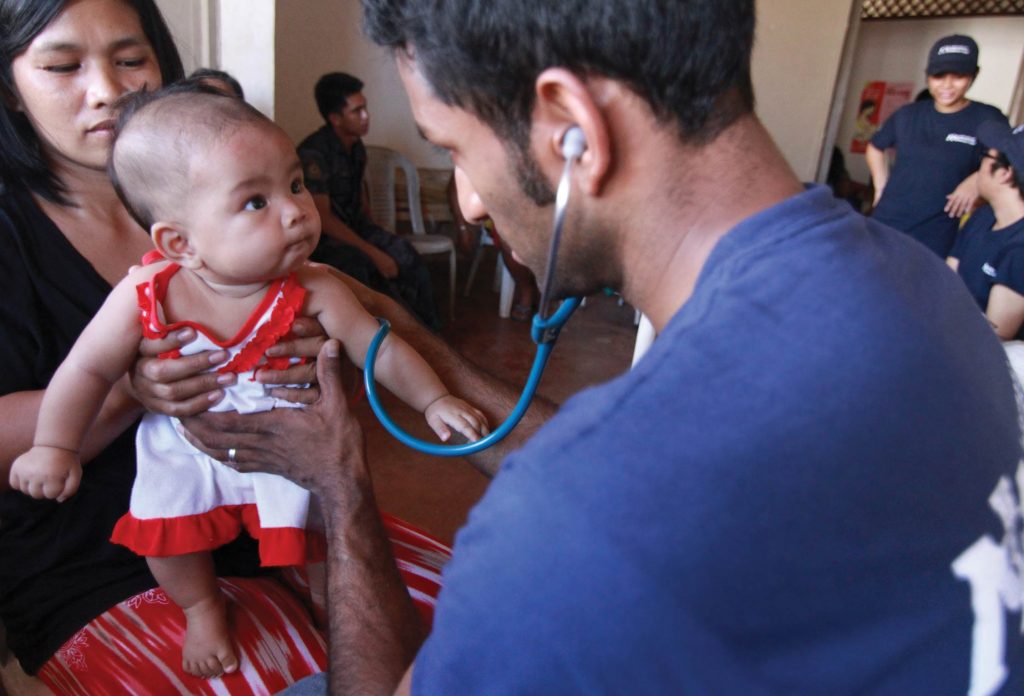
Typhoon
Haiyan
International Medical Corps was on the ground in the Philippines within 24 hours of Typhoon Haiyan, which left widespread devastation affecting an estimated 16 million people. Our teams provided a comprehensive emergency response, delivering 14,625 health consultations in the first 6 weeks alone.
International Medical Corps was able to reach remote communities cut off from health care and basic services by rapidly implementing a network of mobile medical units. Comprised of local and international doctors and nurses, our medical teams collaborated with the Philippine Department of Health and humanitarian partners on the ground to offer primary and emergency care; mental health and psychosocial support; nutrition screenings for children under five; and reproductive health support.
As the emergency needs subsided, International Medical Corps then worked to help rebuild communities and help them become their own best First Responders. Our recovery and development projects supported nutrition, health, mental health and water, sanitation, and hygiene (WASH) in 17 municipalities in Leyte Province, covering underserved, rural and semi-rural communities.




Our Response

Nutrition
International Medical Corps is worked with UNICEF and the World Food Program in 11 municipalities to implement programs that manage and treat acute malnutrition through targeted and blanket supplementary feeding, as well as promote infant and young child feeding. International Medical Corps teams screened children for acute malnutrition, in addition to distributing supplemental foods and establishing in- and out-patient treatment centers. In collaboration with UNICEF, we also trained local medical professionals on screening children under five for malnutrition.

Health & Capacity Strengthening
In the Philippines and around the world, International Medical Corps aims to strengthen the capacity of local health staff to respond to the medical needs of their own communities. We are implemented trainings in seven municipalities to prevent disease outbreaks and promote reproductive and maternal health, reaching hundreds of primary health care providers.
International Medical Corps also rehabilitated and repaired two rural health units that were severely damaged by the storm. In addition, we provided medicines and replaced medical equipment and supplies that were lost or destroyed in the typhoon.

Mental Health
In response to the significant mental health needs that developed in the wake of the storm, International Medical Corps trained and supervised primary health workers in nine municipalities to identify and manage priority mental health conditions according to national and global WHO guidelines. This training program complemented a broader effort to promote mental and psychological well-being, and aimed to include sensitization trainings of over 600 community leaders to develop local response systems for caring for individuals with mental illness. Furthermore, International Medical Corps trained national doctors and nurses in Roxas on Psychological First Aid, which gives the skills necessary to support survivors immediately following extremely stressful events.

WASH
The typhoon caused large-scale damage to local water and sanitation infrastructure, which in turn threatened the health status of vulnerable communities – particularly children. Schools were especially affected and lack of adequate WASH facilities puts students at risk of communicable diseases. To respond to this need, International Medical Corps is repaired or replaced damaged toilets and hand-washing systems in over 100 local schools. In addition, International Medical Corps hygiene promoters taught over 4,000 students basic hygiene guidelines, better preparing them to protect and maintain their own health. The program reached more than 30,000 children with improved WASH services.